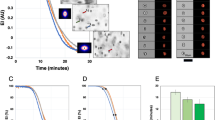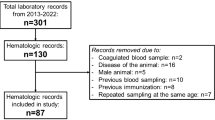Abstract
IN a previous publication1 the finding of a new type of sheep hæmoglobin was reported. This has a slower rate of migration on starch gels than the A and B haemoglobins. It was first found in highly anæmic lambs where its relative amount of total hæmoglobin showed great variation. For these reasons it was called abnormal and tentatively given the symbol N. Blunt and Evans2 reported a new hæmoglobin in sheep with hæmoglobin A type and made anæmic by experimental bleedings. This new type was electrophoretically similar to hæmoglobin B.
This is a preview of subscription content, access via your institution
Access options
Subscribe to this journal
Receive 51 print issues and online access
$199.00 per year
only $3.90 per issue
Buy this article
- Purchase on Springer Link
- Instant access to full article PDF
Prices may be subject to local taxes which are calculated during checkout
Similar content being viewed by others
References
Brænd, M., Efremov, G., and Helle, O., Nature, 204, 700 (1964).
Blunt, M. H., and Evans, J. V., Nature, 200, 1215 (1963).
Kunkel, H. G., Ceppellini, R., Müller-Eberhard, U., and Wolf, G., J. Clin. Invest., 36, 1615 (1957).
Ceppellini, R., Ciba Foundation Symp., Biochem. of Human Genetics, 133 (1959).
Author information
Authors and Affiliations
Rights and permissions
About this article
Cite this article
BRÆND, M., EFREMOV, G. Hæmoglobin N of Sheep. Nature 205, 186–187 (1965). https://doi.org/10.1038/205186a0
Published:
Issue Date:
DOI: https://doi.org/10.1038/205186a0
This article is cited by
-
Production of hemoglobin C in the Moufflon (Ovis musimon pallas, 1811) and the Barbary sheep (Ammotragus lervia pallas, 1777) during experimental anemia: Amino acid composition of tryptic peptides from the ?B and ?C chains
Biochemical Genetics (1970)
-
Fourth Haemoglobin Type in Sheep
Nature (1967)
-
Haemoglobins of Sheep
Nature (1966)
Comments
By submitting a comment you agree to abide by our Terms and Community Guidelines. If you find something abusive or that does not comply with our terms or guidelines please flag it as inappropriate.



